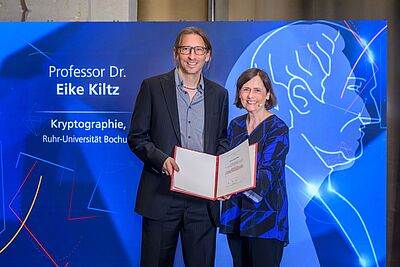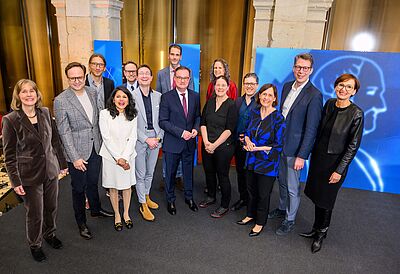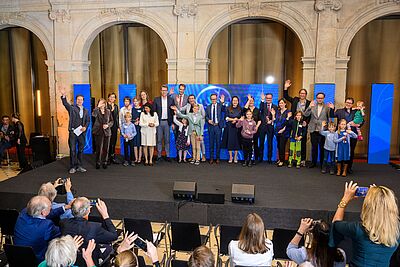On March 13, 2024, Professor Dr. Eike Kiltz, Chair of Cryptography and CASA speaker, was awarded with the prestigious Gottfried Wilhelm Leibniz Prize during a ceremony held in Berlin. This distinguished award, granted by the German Research Foundation (DFG), stands as one of Germany's foremost research funding prizes. Kiltz was recognized for his groundbreaking contributions to post-quantum cryptography, among other notable achievements.
New Security Method Developed
Nowadays, post-quantum cryptography research holds a vital role in cybersecurity. The impending reality of quantum computers poses a threat to current encryption methods, rendering them ineffective in safeguarding our digital data. Collaborating with colleagues, Kiltz has developed a novel approach that has been adopted as a standard by the US National Institute of Standards and Technology (NIST).
The Gottfried Wilhelm Leibniz Prize, endowed with 2.5 million euros, serves as a testament to Kiltz's outstanding research endeavors. This award by the DFG recognizes exceptional researchers who exhibit exemplary achievements early in their careers, with the potential to make enduring contributions to Germany's research landscape. The DFG has crafted a film portrait showcasing the accomplishments of award recipient Eike Kiltz, accessible through the following link.
This laudation delivered at the ceremony hailed the award recipient's accomplishments (find the originial under ->this link)
Our digital communication, whether professional or personal, relies on encryption techniques based on the prime factorization of large numbers or the calculation of discrete logarithms. However, the rise of scalable quantum computers threatens to decrypt such encryption in record time, compromising data transmitted via encrypted channels. Through his pioneering research, Eike Kiltz has paved the way for standards in post-quantum cryptography.
Kiltz spearheaded the development of efficient public-key cryptography methods and validated their resistance to attacks. By devising a new encryption system that rivals the security of factorization problems, he resolved a longstanding cryptographic challenge early in his career. Furthermore, his groundbreaking work on lattice-based algorithms laid the foundation for quantum-safe cryptographic systems. Introducing innovative key delegation techniques for lattices, Kiltz enhanced the functionality of cryptographic protocols, solidifying his reputation as a leading expert in the field. Today, his contributions form the cornerstone of numerous contemporary quantum-resistant encryption methods, with his proofs serving as the basis for security validations worldwide.
Eike Kiltz not only seamlessly integrates theory and practice but also actively shapes international standardization efforts. Together with his team, he played a pivotal role in developing two highly efficient lattice-based cryptographic methods for encryption and authentication, recently adopted as the new international standard for quantum-safe cryptography. These advancements will significantly bolster the digital security of our society in the face of emerging quantum technologies. Mr. Kiltz, your research offers promising avenues to secure our digital endeavors, even in the era of quantum computing. It gives me great pleasure to award you the Leibniz Prize in recognition of your outstanding achievements. Many congratulations!
General note: In case of using gender-assigning attributes we include all those who consider themselves in this gender regardless of their own biological sex.




